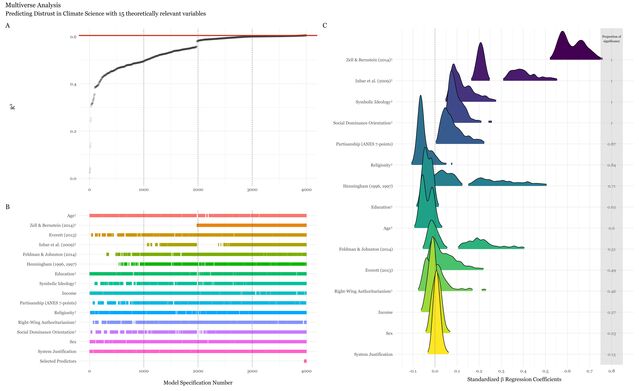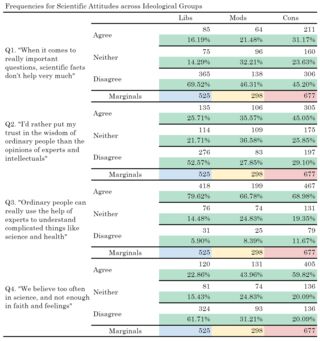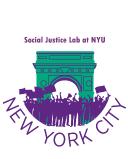Trust
Ideology May Help Explain Anti-Scientific Attitudes
Political conservatism is a strong predictor of the rejection of science.
Posted July 8, 2021 Reviewed by Devon Frye
Key points
- In a large, nationally representative U.S. sample, political conservatism was the most robust and stable predictor of anti-scientific attitudes.
- Conservative respondents were more likely to value faith, feelings, and the views of ordinary people over those of scientists.
- The findings are inconsistent with the view that ordinary citizens are ideologically “innocent” or “ignorant” or that partisanship matters more.
By Flávio Azevedo
On the heels of a global pandemic, Americans have lost an estimated 5.5 million years of life—an average of 14 life years lost per death in 2020.
Recently, the U.S. hit 600,000 deaths and 33 million confirmed infections, the world’s highest death toll. The estimated costs of COVID-19 to the U.S. economy are between $10 trillion and $16 trillion when accounting for lost gross domestic product, premature deaths, and long-term health impairment.
Yet, more than a year into the pandemic, conservative Republicans remain much less likely than liberal Democrats to view COVID-19 as a significant threat to public health; feel vulnerable to infection; comply with COVID-19 prevention guidelines, and be willing to vaccinate against the coronavirus. A poll conducted in late May 2021 found that 41 percent of conservative Republicans—as compared to only 4 percent of liberal Democrats—reported that they would refuse COVID-19 shots. Perhaps unsurprisingly, the U.S. COVID-19 vaccination map, as provided by the U.S. Centers for Disease Control, bears a resemblance to the 2020 election map, suggesting that political factors such as ideology and partisanship play a significant role in what is effectively a life and death decision.
Hesitancy toward COVID-19 vaccines, use of masks, and social distancing are only the most recent manifestations of a broader pattern of skepticism about science propagated by the political right. While many commentators argued that Donald J. Trump made science denialism a linchpin of his policy agenda, he is hardly the first politician to do so. The 1964 Goldwater presidential campaign, for example, was saturated with anti-intellectualism, criticism of leading U.S. universities, and antiscientific sentiment. This trend has continued, more or less unabated, for over 50 years.
Hostility toward science stemming from the political right has, over the years, encompassed such actions as defunding research on stem cells, barring federal funds for women’s reproductive rights, skepticism—and in some cases, downright rejection—of climate science, politicizing scientific research, and denying any detrimental effects of consumer products such as sugar and tobacco on public health (Mooney, 2007; Oreskes & Conway, 2011).
Historian Matthew Dallek wrote, “in some quarters on the far right, liberty and progress are enemies.” As these views spread among the public, social scientists must understand the social and psychological processes that foster antiscientific perspectives.
Of course, some people are more prone to antiscientific thinking than others. Educational attainment and religiosity are predictably associated with distrust toward science. But from the perspective of political psychology, other factors such as one’s ideology and psychology also yield valuable insights. Several studies have found more conservative individuals to be more receptive to conspiratorial ways of thinking and more susceptible to scientific misinformation and other epistemic vices (Azevedo & Jost, 2021; Jost, 2021; van der Linden et al., 2021).
There is also evidence that social dominance orientation (SDO; preferences for group-based dominance and anti-egalitarianism), right-wing authoritarianism (RWA; obedience to authority, cultural traditionalism, and aggressiveness and punitiveness directed at deviants and dissenters), and system justification (motivation to defend, bolster, and justify the social, economic, and political systems on which we depend) may help to explain left-right (or liberal-conservative) differences in views about science.
How Does Political Ideology Predict Attitudes About Science?
My curiosity about the role of political ideology in predicting attitudes about science grew during a Fulbright stay in Professor John Jost’s Social Justice Lab at NYU. While there, I became especially interested in the relative importance of various psychological predictors of antiscientific views, independent of demographic factors such as education and religion.
To tackle this research question, we leveraged two large survey datasets, (a) an exploratory, quota-based survey of 1,500 adults that was nationally representative of the U.S. population in terms of age, education, income, and sex; and (b) a confirmatory (replication) convenience sample of 2,119 Americans from the same population. We collected the confirmatory sample to minimize the influence of false positives and maximize our results' generalizability and robustness. In both data sets, we systematically investigated the effects of 15 different predictor variables on distrust of climate science, skepticism about science (vs. faith) in general, and trust in ordinary people (vs. scientific experts).
Our results, which were recently published in a special issue of Group Processes & Intergroup Relations, show that most of the 15 predictors—age, education, gender, religiosity, income, symbolic ideology (ideological identification), five measures of operational ideology (issue-based opinions), political partisanship, RWA, SDO, and system justification—were significantly associated with attitudes about science.
When all of the variables were analyzed simultaneously, we saw that distrust of climate science was predicted consistently by lower levels of education and higher levels of religiosity, as expected, and higher levels of SDO and political conservatism. Interestingly, partisanship—in this case, identification with the Republican Party—did not "survive" as a robust predictor of distrust of climate science. The most important predictor was political ideology—whether it was measured symbolically in terms of ideological self-placement or operationally in terms of policy preferences. The higher the conservatism scores across ideological measures, the higher the distrust in climate science.

When accounting for all possible combinations of variables in the model (panels A and B in Figure 1, above), ideology not only explains more variance—it clearly dominates partisanship in models that explain the most variance. Conservatism predicted antiscientific attitudes significantly more than 99.99 percent of the time across all possible model specifications (panel C). Ideology was a better predictor of distrust in climate science than partisan identification. It explained more variance, was highly stable and robust across various operationalizations, and exhibited comparatively large effect sizes—even in models including competing predictors.
We were also interested in determining whether these patterns would generalize attitudes toward science in general—e.g., skepticism about science (vs. faith)—and attitudes towards epistemic authorities, comparing trust in ordinary people with trust in scientific and other experts. We obtained similar results as above, even after adjusting for distrust of climate science in particular, except that RWA (rather than SDO) was associated with skepticism toward science in general. Trust in ordinary people (vs. scientific experts), our third dependent variable, was robustly predicted—in order of their relative importance—by political conservatism, distrust in climate science, RWA, lower education attainment, Republican partisanship, and system justification.
It may be worth noting that the explanatory power of these models was comparatively large, accounting for approximately 60 percent of the variance when predicting distrust in climate science, 50 percent for skepticism about science (vs. faith), and 30 percent for trust in ordinary people (vs. scientific experts).
What Does This Mean?
There are a few big-picture takeaways from this research program. Overall, we found that—contrary to the common assumption that ordinary citizens are ideologically “innocent” or “ignorant” (Azevedo et al., 2019; Jost, 2006, 2021)—conservatism robustly predicted anti-scientific attitudes and did so much better than affiliation with the Republican Party per se. We also found little support for the view that the role of conservative ideology in shaping attitudes about science is primarily confined to skepticism about climate change.
We discovered that conservatives valued faith, feelings, and the views of ordinary people over those of scientific experts even when we adjusted statistically for distrust in climate science. In The Hill, Mark Mellman wrote about our study, noting that:
By three-to-one, conservatives agreed, “We believe too often in science, and not enough in faith and feelings.” Liberals disagreed by nearly the same margin. By two-to-one, liberals would rather put their “trust in the opinions of experts and intellectuals.” At the same time, by a slightly lesser margin, conservatives repose their trust in “the wisdom of ordinary people.”
These ideological differences are borne out in Figure 2.

Another takeaway from our research is that there appears to be a robust connection between certain psychological dispositions (such as RWA, SDO, and system justification) and attitudes about science. Indeed, these psychological dispositions explain a great deal of unique variance even after adjusting for demographic variables, political partisanship, and ideology (Azevedo et al., 2017, 2019; Womick et al., 2019).
It is troubling these days to see so much ideologically motivated anti-intellectualism and outright rejection of science on the right and, to a lesser extent, the left. The unjustified denial of scientific evidence—whether about social distancing or other measures to prevent infection during a pandemic, hesitancy about vaccination in general, or embracing political candidates who impede action on climate change—can be profoundly detrimental to public health, the natural environment, and the economy.
We hope that research in social science can help citizens in democratic societies to make reasonable, informed decisions about complex scientific questions such as those about climate change, childhood vaccination, and the handling of pandemic diseases.
As the journalist George Pyle has observed, “the key to having a free society—one that is both really free and truly a society—is for most of us to be pretty good at knowing when we should do as we are told and when we should not.” It is no exaggeration to suggest that the fate of our democracy is yoked to a socially shared capacity and willingness to understand and trust scientific evidence and expertise—not because they are infallible, but because they are vastly superior to the alternatives at hand.
References
Azevedo, F., & Jost, J. T. (2021). The ideological basis of antiscientific attitudes: Effects of authoritarianism, conservatism, religiosity, social dominance, and system justification. Group Processes & Intergroup Relations, 24(4), 518-549.
Azevedo, F., Jost, J. T., & Rothmund, T. (2017). “Making America great again”: System justification in the US presidential election of 2016. Translational Issues in Psychological Science, 3(3), 231. https://doi.org/10.1037/tps0000122
Azevedo, F., Jost, J. T., Rothmund, T., & Sterling, J. (2019). Neoliberal ideology and the justification of inequality in capitalist societies: Why social and economic dimensions of ideology are intertwined. Journal of Social Issues, 75(1), 49-88. https://doi.org/10.1111/josi.12310
Jost, J. T. (2006). The end of the end of ideology. American Psychologist, 61(7), 651.
Jost, J. T. (2021). Left & right: The psychological significance of a political distinction. New York: Oxford University Press.
Mooney, C. (2007). The Republican war on science. Hachette UK.
Oreskes, N., & Conway, E. M. (2011). Merchants of doubt: How a handful of scientists obscured the truth on issues from tobacco smoke to global warming. Bloomsbury Publishing USA.
Van der Linden, S., Panagopoulos, C., Azevedo, F., & Jost, J. T. (2021). The paranoid style in American politics revisited: An ideological asymmetry in conspiratorial thinking. Political Psychology, 42(1), 23-51.
Womick, J., Rothmund, T., Azevedo, F., King, L. A., & Jost, J. T. (2019). Group-based dominance and authoritarian aggression predict support for Donald Trump in the 2016 US presidential election. Social Psychological and Personality Science, 10(5), 643-652.
This research is open access and can be accessed here




